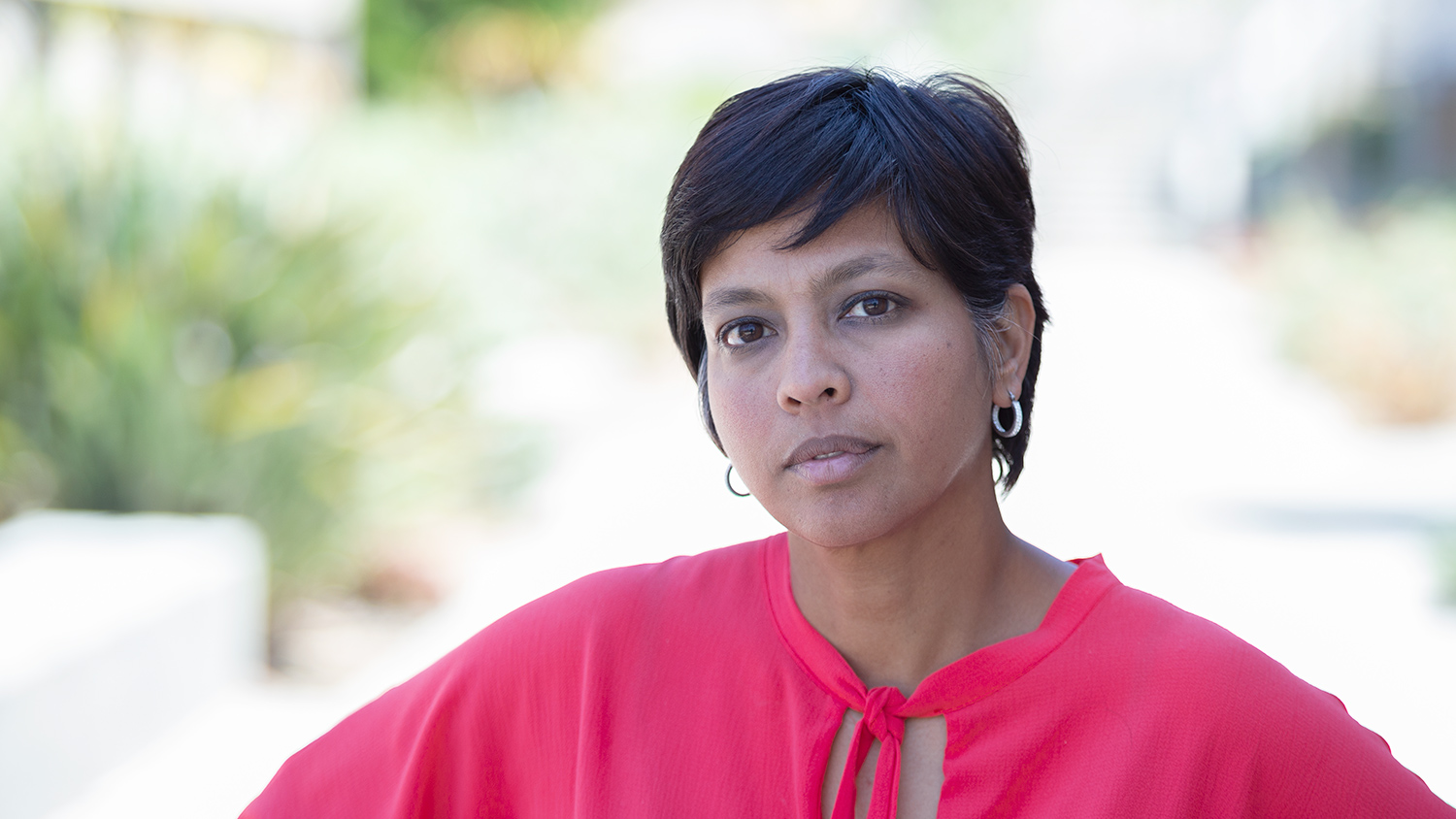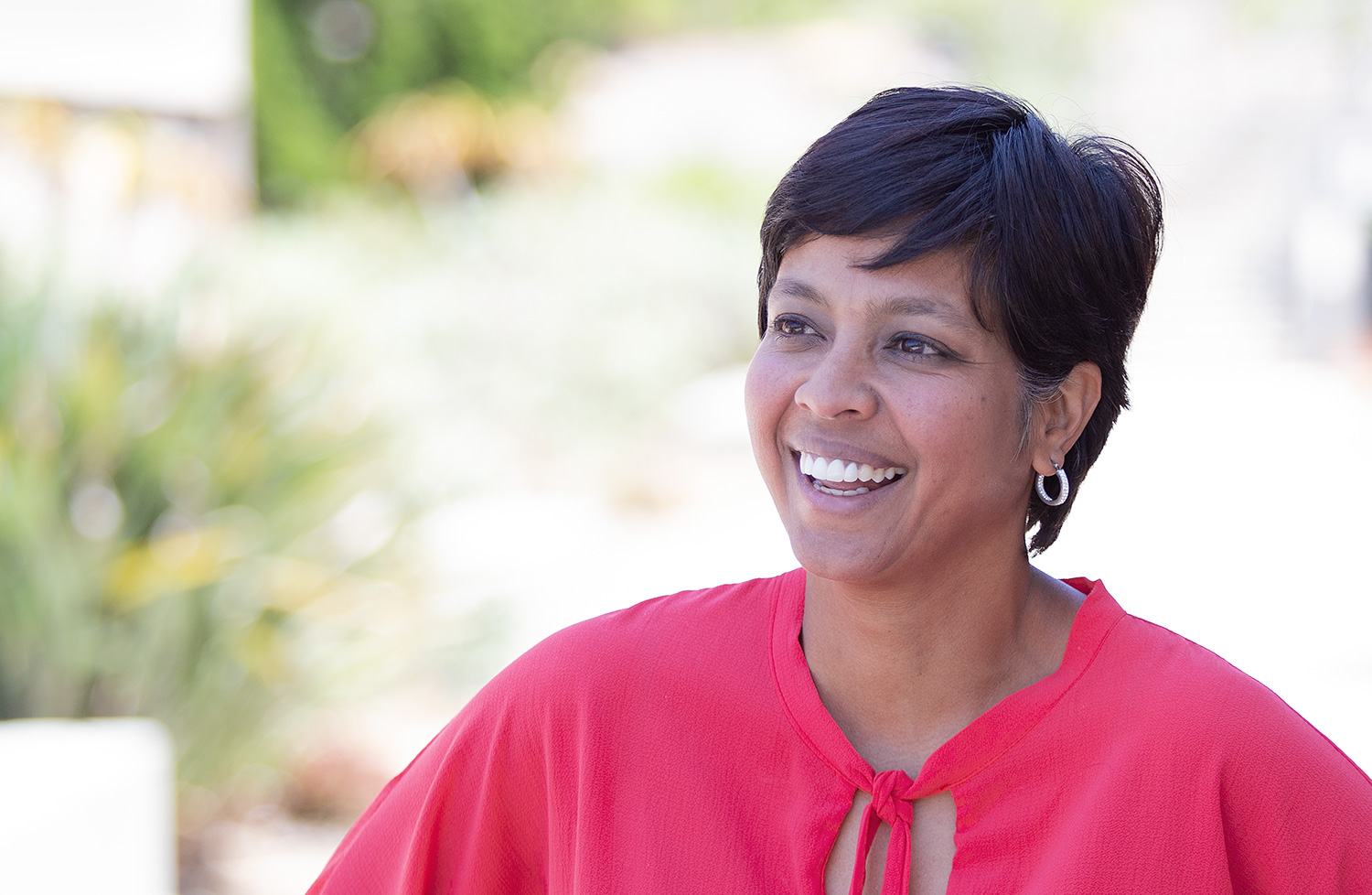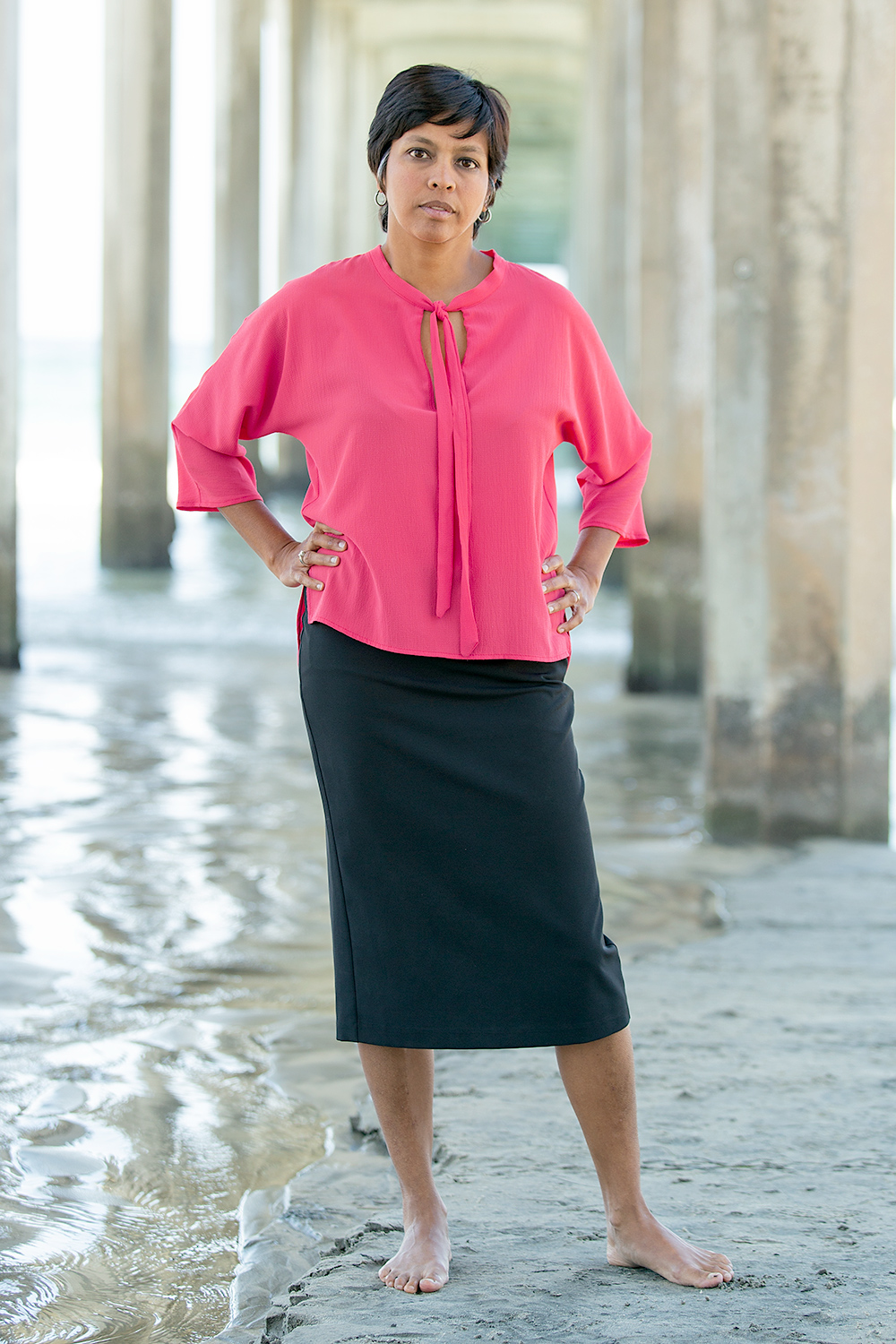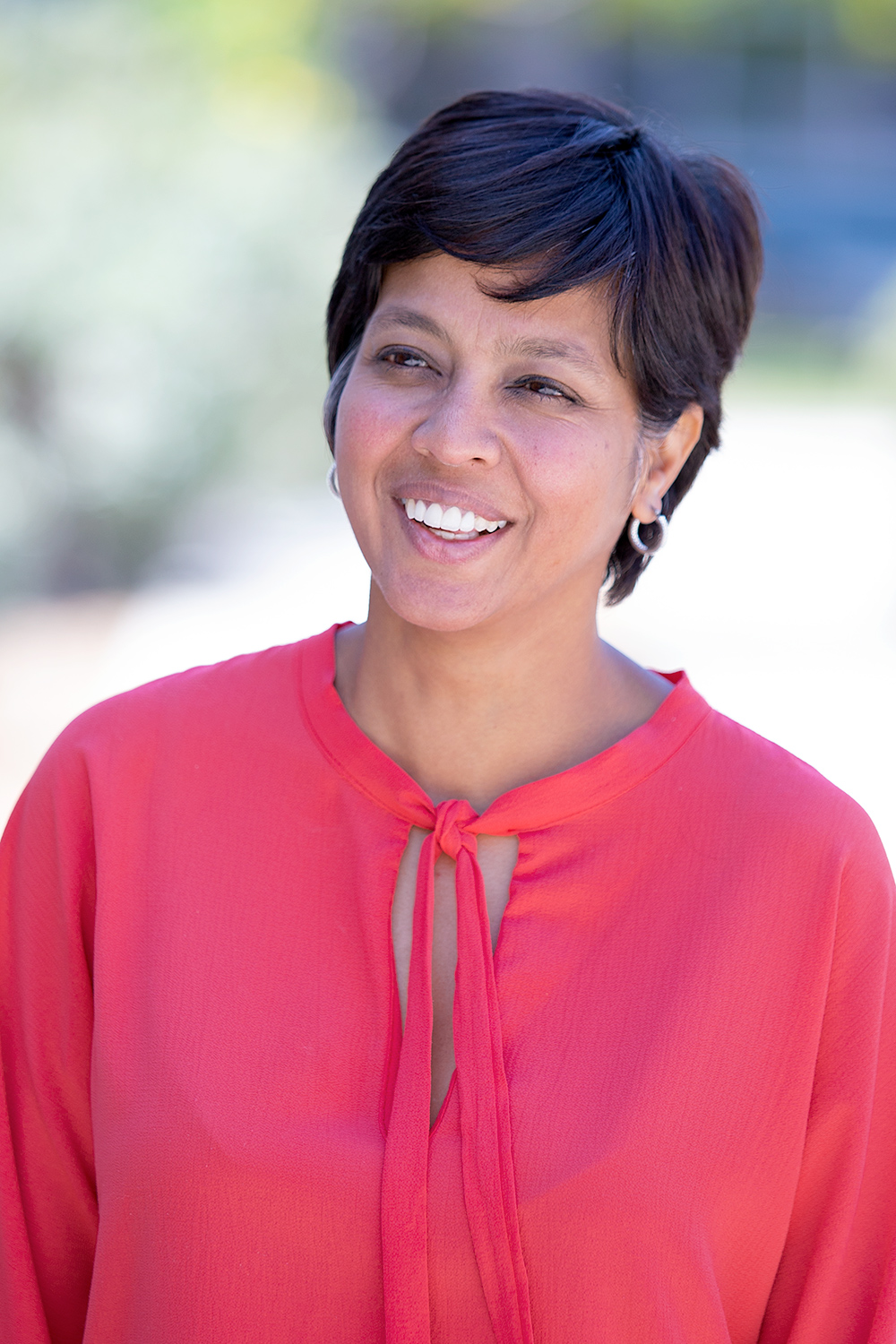- Article № 007
- August 2018
Lihini Indira Aluwihare
- Oceanography

Did you picture yourself being out on the ocean when you were younger?
No. [Laughter]
I mean... I was born in Sri Lanka, which is an island. And, as a culture we weren’t really into ocean swimming at that time. I mean, we would be in the water—the ocean water—very rarely. There’s no beach culture... I mean, it’s an all-tourist beach culture. We never went and sat on the beach. At the time, people didn’t associate the ocean with recreation. People—the fishermen—associated it with making a living, as a resource. And, a lot of people that were living along the coast weren’t formally taught to swim either, right. Because of the monsoons, it can be very rough. There was probably a danger aspect to it. So, I don’t know if it’s that we have a different relationship with the ocean—I was too young to remember culturally why that is. I moved from Sri Lanka when I was 7 and I grew up in a landlocked country, so the ocean was not a big feature.
Were you at least attracted to nature in any kind of way growing up? Did you play outside a lot?
Yes. Yes. And I think... you know, when I go to schools, and when I talk to kids, I always say, "... Most children, naturally, are drawn to nature." You know, in Sri Lanka, we didn't have a lot of toys or anything, so we were out there everyday all the time.
And then my grandparents—my mother’s side—they had this old, old estate, where they were growing all different kinds of things: coco, mangoes, avocados, rice—they had rice paddy fields. That’s where we would go on holidays, and as kids, when we were there, we were just running around... and getting into trouble... or getting lost... and chasing crabs. And then you come back to eat, or you know, you steal into your grandmother’s larder and try to find the sweets and stuff like that. [Laughter] So, I was into nature… But, I don’t think I ever thought I would be a professional scientist.
You didn’t? Are there any influential experiences or significant memories from your childhood in Sri Lanka, that you can recall, that shaped you? Or had an impact on your identity?
I mean, I have memories of very specific experiences, you know… like, how much time we spent in my extended family community. And that was really important, because even after I left, I kept that connection, so I feel like that’s a very significant part of who I am, you know.
I was from this area called Kandy, which is in the hills. And, you can tell people were from that part, because the names are all associated with villages. So, like with my last name… there’s an Aluwihare village. And there is a very, very historically significant Buddhist temple there—the Aluwihare Temple. They claim it was the first place where Buddhism was actually written into long rectangular palm leaves—they call them Ola leaves. And like… this was the temple... [using her hands to show location and distance] ... there was a little dirt path, and then there was my dad’s parents’ home.
Oh… like, essentially right next door to the temple?
Yeah. We didn’t spend much time with my dad’s side of the family, but for that part of the experience, the temple was our playground. Now, when I go and I see these rocks and stuff, I’m like, “I remember climbing those.” [Everyone laughs] So, I remember hanging out with the main priest, and he would try to teach us. You know… you would sit in front of him, he would try to teach you something, and you’d go off and do something else. [Laughter] I mean… at that age, respecting the priest was kind of beaten into us, so we did respect him. But, for me... that was a playground.
A playground for you, but what about your family? Did they identify as Buddhist?
Yes, yes. Very much so. My mother’s side for sure. I mean, they were much more into the ritualistic side of Buddhism. And, I don’t go to temple or anything like that now, but when I go to Sri Lanka, I go to temple just because of the memory of it—the smells. There’s all these open, clay lamps with coconut oil. And that smell… it invokes a very visceral response from me. So, I do go when I’m there. And then, of course, my father is much more philosophical about Buddhism. And I think his perspective made sense to me. It’s easy to be philosophical, right. It doesn’t take as much time as being dedicated and going to temple...
... You can do that from your couch. [Everyone laughs]
Exactly. [More laughter] And so I think I'm a lazy Buddhist [Even more laughter] But, it’s like anything else from your childhood—you have good memories of it. It’s not something I disrespect, it’s just something I’ve chosen not to continue.
But do you identify as a Buddhist now?
Yes. I mean, I think I identify as a Buddhist because culturally, that’s who I am—that’s the cultural identity that I have. But, I don’t believe in reincarnation. For me, I adhere to the part of Buddhism that is the universal part of all religion, which is kindness, right. It’s just how you live your life, and that kind of philosophy was how my family lived—or tried to live. And, I think the other thing about Buddhism, which is good and bad, is you deny yourself a lot of things...
… Like being non-materialistic?
Yeah, it’s non-materialistic, but it’s also keeping your emotions in check—keeping your desires in check—living a very controlled lifestyle. That makes you unselfish, right. Because it’s not just materialism—it’s desires. All of those things are part of what makes you selfish. If you want something for yourself, you may hurt others in doing so. And I think that philosophy was very strongly ingrained in my parents’ generation. So, I think it really restricted who they became.
And yet… you became…
… Yes. Yes. I was not prepared for all that self sacrifice. [Everyone laughs] No... I think that was education, right. For me, it was reading—I read many different books as a kid. So, I just had a totally different window into the world than they did, because they lived that identity all the time.
That makes me wonder why you moved away. I mean, you have deep familial roots in Sri Lanka—both sides of your family—but yet, you moved away at 7. What influenced that move?
Well, in Sri Lanka, when people see my last name, they associate me with these very, well-respected families. So, my family reputation is high, but [neither] of my parents were very well off. My father couldn’t finish high school because he had to help his family, but he [eventually] got a professional degree in land surveying. And at the time, it was really hard to rise through the ranks in Sri Lanka without somebody pulling strings, and he really didn’t have the connections. And, I think he felt that they would never really have financial security—and my mother wasn’t working. So, we moved to Zambia.
At the time in Zambia, everything had been owned by the British, and copper mining was their main industry. But when the Brits left and went back to England, they still maintained a certain control of the copper mines, but left no skilled workers. So, all these jobs had to be basically filled by foreigners. When I was growing up in Zambia, my circle of people were all expatriates. I mean, there were lots of people from Sri Lanka. The Indian population was everywhere. The Indian population had been in Africa for a long time, so they’re in the mines, but also shopkeepers, and things like that. Most everyone else was an expatriate, and somehow associated with the mining industry.
So the idea was to earn some kind of dollars, or pounds, or foreign exchange, and then come back to Sri Lanka. But, you know, we ended up staying and I pretty much grew up there.
Do you remember having an interest in science or nature while growing up in Zambia? Or… do you remember your parents directing or guiding you towards science and nature?
Well… I remember our books. In Zambia, as the British and different expats were leaving, they would sell their stuff. And, the stores only had very rudimentary things, so we would go to these house sales and my dad would buy me books. And, I remember that all the books were all about animals, or nature, or something like that. And, another thing that my dad bought me at a house sale was this chemistry kit. This is the eighties. And looking back, I’m like…
… a real chemistry set?
Oh yeah. I'm surprised. You know, we had… a Bunsen burner… and sodium. We actually had sodium—like, pieces of sodium. [Laughter] I mean, I cannot believe that they were selling that stuff. And so I would do things. I mean, I was no genius; I think I was mostly following instructions. [Everyone laughs] It wasn't like I suddenly made plastic in my home or something like that. [More laughter] I remember that he bought us a microscope from a house sale. So, I remember looking at things under the microscope. I would say it was more like a naturalist-type interest. I don’t think I ever… I mean, I think I had fun with the chemistry set, but it doesn’t stand out as the thing that really inspired me. I mean, we were just surrounded by stuff like that. He would buy us all of these books on science and nature, and you know… that’s what we read. I’m assuming he did that on purpose. Or… I don’t know if it’s just what happened to be available.
I wonder if it was intentional? Let’s return to that idea in a second, because, I think you then moved again, right? What prompted this second move?
Well, because of the affiliation with the mines, I had the opportunity to go to boarding school in England. In my mind now, I look back and think that it was all very devious…
… Why do you think it was devious? You mean from a colonial perspective? How was boarding school and mining connected?
Well, the mine was 51 percent owned by British, and I think it was their way of getting money back into England. So, they would pay for all of the expatriate kids to go to boarding school.
Ahh… and then income would be funneled…
… Yeah. I mean, that’s how I see it. I’ve never read about it, so I don’t know the motivation, but looking back… I mean, most of us went every holiday. The plane leaving to London would be packed—just packed. And, it was just school kids—teenagers. It was like a teenage bus. [Everyone laughs]

After growing up in Sri Lanka and Zambia… going away to boarding school in England must have been such a culture shock, such a drastic change.
You know… I think the whole experience was such a culture shock for me because I’d never been to the “first world” before. But, you know, you’re 12 or 13. You already have so much hormone-ridden angst as it is. And I think you’re just batting things as they’re coming at you—you’re just trying to survive. You’re not saying, “Okay. My experience is different from someone else’s.” I mean, that’s where I was exposed to like… really lots of wild things for the first time. I was really poor by the standards of most of the kids in that school. So, everybody was always making fun of something. But, there were other students like me who had come under these same kinds of weird conditions, and we found each other. But, it was good. I went to an all-girls school. It was actually a methodist school, so we would go to chapel every morning…
… You’re boarding school was Methodist? Did that cultural change from Buddhism to Methodism add another layer of shock to the experience?
So, the Methodist part wasn’t as much of a shock to me—I loved singing hymns. Our religious education teachers were all very good. I never felt like they were trying to convert us. Even going to chapel every day, if you didn’t want to say the prayers—if you didn’t want to do anything—you were allowed not to. I mean, there were kids who were Muslim—there were kids from everywhere in that school. Like, one of my friends was from the UAE, the United Arab Emirates. I mean, people from everywhere—Africa, Asia. Not as many from the U.S. or Europe. I think the only two American kids that were in my year, their parents lived in England, so they were at the school as “day girls.” So, I think there was so much going on… being by myself. And, you know, just trying to assimilate. Fit in. Deal with everything. You’re just taking everything in, and kind of making it your own, in some kind of way. You know, kids are so resilient.
Kids are also pretty mean, too.
Ohhh yeah! There were some mean girls! [Laughter] Oh yeah.
But, you know… I think that’s where I learned the power of academics, where I didn’t have a lot, but I was pretty good at school at that point. And I was really motivated to study. And so, I really recognized how much of a ticket out of... you know... whatever. Not that I was in a bad situation, but to get to a better situation, I could use my education, even though I wasn’t financially in a position to do that. So, I think that was a really important learning experience for me. It definitely gave me a lot of confidence.
In a previous interview, you said that you had really good chemistry teachers. Is this it?
Yeah, I had these two unbelievable teachers in boarding school.
So, aside from having the home chemistry set, is this where chemistry blossomed for you? With those teachers?
Totally. I mean, I loved them. I loved chemistry because they loved chemistry and were able to convey it. I mean…
… You could feel their enthusiasm?
Yeah. Totally. And, you know, boarding school is weird because those teachers see us all the time. So, it's very easy for them to convey their passion. It's a very different relationship from what kids have here. One of the chemistry teachers lived on campus. We saw them all the time. They would be at lunch and dinner. You'd see them on the weekends. So they were parents to us in some ways. So it was a very different relationship to have with teachers. Mr. Hattersley—he was a retired Cambridge professor—he was hilarious because he just had no boundaries. We’d be like, "Oh! Mr Hattersley! There's not enough thermometers for this experiment!" And, you know, it's supposed to be 60 degrees, so he goes, "Put it on your palm. If it burns you, it's too hot. If it's warm, it's just fine." [Everyone laughs] Like, I remember one time he made us sniff chlorine gas that he made in a bell jar. I mean, you couldn't do any of that stuff here. [More laughter] Yeah, it was great.
Chemistry came really easy to me. That was true in college too. The part of chemistry that I work on now—it’s very innate to me. I don’t know why it’s that way. I think it was a way I learned to solve problems.
In a previous interview you mentioned an attraction towards the puzzle aspect of chemistry.
Yeah, exactly. That's totally how I feel about it. I really gravitated towards analytical chemistry. In analytical chemistry it's easy to think about it in a puzzle forum because you have to use these different techniques. You know, one technique gives you a snapshot on one aspect of a molecule; another technique gives you a snapshot on another aspect of the molecule, and then you have to put those pieces together to get sort of the final picture. And that worked really well for me. I had a friend here the other day and she was like, “Maybe it's because we both liked reading mystery novels.” Like, I read all of Agatha Christie novels. [Laughter] Oh my gosh.
Do you think she's onto something? Do you think it’s innate?
Well, I think about it and I think, "Maybe that makes sense." I don't know, you know. I think people's heads are wired differently. But I think what's innate is what you connect with. And, I don't mean it's innate in that you can't train yourself to be that way. It's rather not your ability, but sort of your really deep connection to something, you know. Because when you become a scientist as a profession, people think it’s just all fun. But, more than half of the time—probably three quarters of the time—things aren’t working. And to make it through, you have to really want to get to the end—you really want to have that result. And that is not an intellectual thing. That's almost an instinctual desire and connection that you have.
I mean… you then moved onwards and pursued chemistry in the states, right? M.S. at Mount Holyoke; Ph.D. at M.I.T. and Woods Hole. So, do you think this is just innate connection or is there a drive behind these pursuits?
So... it's really interesting what the differences are in terms of what drives people. And I think that’s the key to me. When people say, “Oh, you must've been really clever." I’m like, “No… it’s opportunity and luck,” right. Like, I didn't have a lot of choices—I had to stay in school. My parents had moved back to Sri Lanka; I was in boarding school in England. You know, I could have gone back to Sri Lanka where my family was, but I had no identity with it—I'd really grown up in Africa. But they weren't there. And so, then I came to the U.S. and the only way I could stay on a student visa was to stay in school. So, when you think about it, there’s a lot of things that go into whatever path you choose.
And, I think people need to recognize that some people are born into it. There's plenty of my colleagues here whose parents were scientists, and they don't know anything different. And that’s a very different breed of scientist than someone like me who came into it by accident… maybe. So, it's problematic when people say you have to have a certain kind of mindset, or you have to have a certain level of intelligence— or whatever it is—because that automatically makes it seem like only some people can do it. It separates.
It suddenly become this exclusive thing…
… Yeah, it becomes too exclusive. And, I don't think it's like that. That's not what my story is... you know. For a lot of people who came into science because of their parents—the pedigree—it’s hard for them to recognize that there were so many places in their lives that basically program them to be here. They think it was just because it’s something innate, you know. Like some people are good scientists and others are not. And they have to have this kind of pedigree to be a good scientist. If you didn’t go to Caltech, then you’re obviously not good enough to go to Caltech. And I’m like, "No. What happens if you had to take care of your parents or something?"
Do you think it comes down to opportunity?
A lot of it is opportunity, but part of it is just not having the educational background that allows them to compete. But it doesn't mean that you couldn't capitalize on that somewhere. And if they've shown that they can rise above those circumstances, then that alone should be something to pay attention to, but…
… You would think.
You would think. But it's really interesting because I think people who are privileged—which this is not a epiphany—but, it's very difficult to teach privileged people how privileged they are.
I wonder… so, your father brought a lot of nature- and science-based books into the house, and brought home a chemistry set, and a microscope… I wonder what his drive was behind these acts. I mean, was he guiding you? Directing your path? Have you ever spoken to your father about why he did these things?
No. So, it’s funny… that’s a whole-other-lifetime story. They moved back to Sri Lanka in the early nineties. When [my brother and I] were in the U.S., we only saw them once—for financial reasons. And then, while I was in my Phd, my brother bought them plane tickets to come to the U.S., and that was the first time my dad had ever been outside of a “third world” country—which is shocking, considering what my brother and I had lived up to that point. For my mom, that was the second time—she came to drop us off at our respective colleges when we first started school here. And so, they were there until November, then went home in December. And then my mother got very, very sick, and she died in January.
I’m so sorry…
… So that was like 21 years ago. I was 25. It was during my PhD. And, so then my father... my father just became a very different person. And he… the long story short is he has severe Parkinson’s. And two years ago, I moved him from Sri Lanka and was actually taking care of him at my house until just last month—June. He’s with my brother right now. And so, I think by the time we wanted to know about all of those things, he wasn’t in a place to… like now, you know… he has moments of clarity. But, I’m not sure he would have been able to answer a question like that, even when he was better. Like, whether he was being very deliberate. I think in part, for my father, he was interested in all of those things too.
Would he look through the books as well?
Oh, yeah, yeah. He really tried to teach us…
… so maybe he was following his own interests?
I think that's what it was. I remember him explaining things to us that we didn't understand, because he had already read them. So I think that was really mostly what it was. And then for me to identify chemistry as my career, that was not... you know, I just loved it. I did well in it. I stuck with it, you know.


Your parents seem to be very influential in your path to science, whether direct or indirect. So, I was hoping we could turn that direction inward and talk about your experience as a mother. Your son's nine. And you've been an academic much longer than nine years. Do you see a difference pre-motherhood and post-motherhood? Has motherhood influenced your research or has your research influenced you being a mother?
I think in terms of a temporal scale, I think being a researcher definitely affected being a mother. Whether it's real or perceived, I've felt as though I had to get my career to a particular place before I could have a child. And that place has a bound by whether you can have children later, after that first child. I mean, it's something I think about all the time because my son is always bringing up how he's the only child, "How come everybody has a brother and sister," and I say, "Well, you don't have to share." [Everyone laughs] And, so I do think about that a lot because it did complicate my chances of having a second child. But, I think because I love my independence, I love my career... I am selfish in that sense. And my son will be the first person to tell you that. [Everyone laughs]
But, I think being a mother influences so many things. It’s humbling to be in a position where something is so important to you, you’re willing to put everything else on hold. Something that’s so important to you, that you don’t really own. You know, you’re not going to get that much recognition for being a good parent. Hopefully your child doesn’t grow up to be a mass murderer, but you can’t control that either all the time, you know. But, you know you don’t own that person. Especially as they get older, you realize how they’re just going to go out there… and they may never… if they choose not to see me again, I don’t have any control over that. And so, I think that is a humbling experience. It just gave me enormous respect for my parents, you know; what they must have had to do, and the sacrifices they made to send us to boarding school. My mother never recovered from sending us to boarding school. I mean she would just cry... it was so hard for her. And, as a kid… as a 13 year old, I’m like, “Shh… see ya!” [Everyone laughs] Now looking back, I’m like, “Oh my god! How could I have been so callous.” So that perspective… I think…
… I guess you are about to learn it when your son turns 13. [Laughter]
Exactly! Yeah, oh yeah! I'm sure. And he will have no problems telling me. [Laughter] Yeah.
So, motherhood… that gives everybody that perspective, right? Hopefully. I think from a practical aspect, being a mother makes you more efficient. And I think efficiency just teaches you how to figure out what's important, or how to take a shortcut that's just as good, you know. So you learn to approach a problem in a more efficient way than you did in the past.
Which sounds a lot like creativity, right? There’s even an interview out there where you use that word “creativity” with respect to science and research. So, since motherhood has influenced you to be creative with your time and approach to science, I’m wondering whether you think creativity is necessary to pursue science, or to become a scientist? And if so, could you provide an example?
Creativity is really key—definitely for the science that I do. I mean, when we go to sea… honestly, you can prepare as much as you want, but when you get out there, invariably, you either forgot to pack something, or something broke, or what you thought they had [onboard] they didn’t have—those problems can be a myriad of things. And these [research cruises] are costing $30,000 a day, so you’re not going to be like, “Ahh, okay. Well, I guess this will be a vacation.” No. You have to figure it out. Or, in the lab, every day, every instrument that someone's working on breaks. It doesn't matter if you have the greatest tech in the world—something's going to break. And, you have to figure it out. It's just part of it. So, from a practical standpoint, that's for sure true. So there’s one example of creativity.
Even in terms of how you interpret your data. This is still a very new field, and a lot of what we do is on the interface of different fields, but it’s still new science. I mean, everything you discover is new, almost. It may not be interesting to anyone, but oftentimes it's new—someone hasn't seen it that way. And, if you don't have creativity, you can't see something new, in a way, because you're always bounded by what you know. People always say, "You know, you can't go further than someone else if you only walk in their footsteps." And I feel like that's kind of how creativity is to me. You have to be able to visualize something someone hasn't already seen. And what you picture or thought could be wrong, but you have to be able to visualize something in a way that someone hasn’t. And so, I do think creativity has a lot of different meanings for me in that sense. But really, I think of it more as problem solving, you know. And, I think good problems-solvers are usually really creative, because they can step out of their comfort zone and come up with ideas.
So yes, I think it's really critical—I think it's critical for life, honestly. For me, I'm definitely not bound by the limits of what we know. And in my own life, I couldn't be like that. Like, I couldn't have gone to England, and gone to boarding school... come here by myself... made it through Mount Holyoke… and like… if I was [only] looking at the experiences in my family, or the experiences of what I knew… that would have limited what I could do.
Lihini Indira Aluwihare is currently a professor at Scripps Institutue of Oceanography, University of California, San Diego, in La Jolla, California. Lihini holds a Doctor of Philosophy in chemical oceanography from Massachusetts Institute of Technology/Woods Hole Oceanographic Institution Joint Program in Oceanography, in Woods Hole, Massachusetts, and a Bachelor of Arts degree in chemistry and philosophy from Mount Holyoke College, South Hadley, Massachusetts.